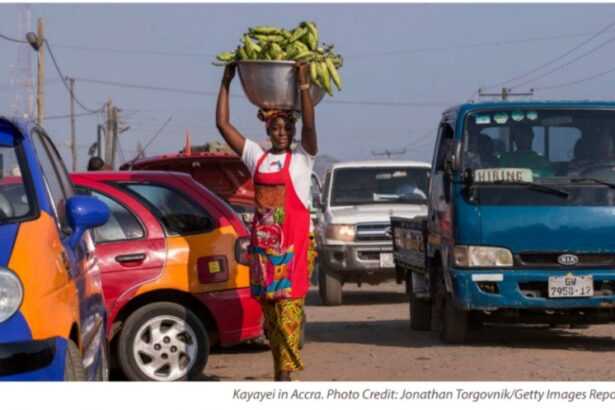The cost-of-living crisis in Accra, Ghana, has had a significant impact on informal workers, according to a new report by WIEGO (Women in Informal Employment: Globalizing and Organizing).
The report, which was conducted in October 2023, found that inflation has led to decreased purchasing power and lower demand for the products and services of informal workers. The report also found that workers in the informal economy are facing increased competition, lower bargaining power, and limited options to adapt their livelihoods.
The report highlights the alarming inflation rate in Accra, which averaged 35% at the time of the research. The hardest hit sectors include food and non-alcoholic beverages (+45%), health services (+28%), housing, water, and electricity (+25%), transport (+25%), and education (+13%). The typical worker interviewed for the study earned only GH¢ 1,500 per month, working six days a week, while the average monthly living wage required for a basic, but decent standard of living was GH¢ 2,922. The situation is particularly dire for kayayei, who earn a meagre GH¢ 500 monthly.
The breakdown of typical monthly earnings by occupation was as follows:
- Kayayei (head porters): GH¢ 500
- Street vendors: GH¢ 1,250
- Waste pickers: GH¢ 1,300
- Market traders: GH¢ 2,200
The report further reveals that a typical worker’s household spends more than half of its income on food, leaving little room for other essential expenses like education, transportation, and healthcare. The lack of social safety nets for informal workers, with only 3% enrolled in the three-tier pension scheme in 2020, exacerbates their vulnerability to economic shocks.
It also found that the cost-of-living crisis is affecting workers in informal employment in a number of ways. For example, the report found that market traders and street vendors are facing lower demand for their products and services. The report also found that waste pickers are facing lower selling prices for the waste they collect. The report also found that kayayei (head porters) are facing lower demand for their services.
wiego-accra-cost-of-living-april-2024The cost-of-living crisis has forced many informal workers to adopt desperate coping mechanisms, such as reducing food consumption, working longer hours, and incurring debt. The report also highlights the negative impact on the physical and mental health of these workers, who often experience exhaustion, malnutrition, insomnia, and anxiety.
WIEGO calls on the government to take immediate action to support informal workers, including providing cash grants and soft loans, controlling inflation on essential items, and recognizing the workplaces of informal workers as legitimate sites of work. It also emphasizes the need to invest in the occupational health and safety of these workers and remove barriers to accessing healthcare.
The WIEGO report serves as a stark reminder of the harsh realities faced by informal workers in Accra. It is a call to action for policymakers and stakeholders to address the urgent needs of this vulnerable population and ensure their economic resilience in the face of the ongoing cost-of-living crisis.
Source: 3news.com




